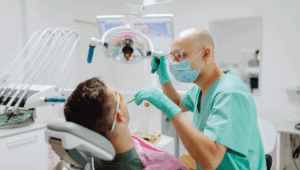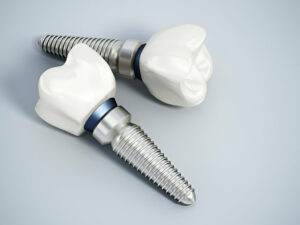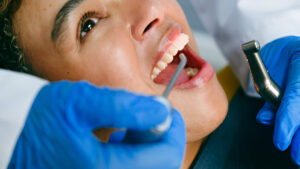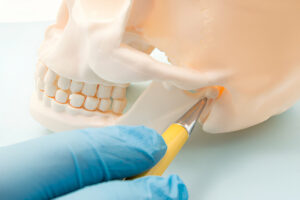Summary:
Are you experiencing stiffness in and around your jaws and muscles lately?
This could be your sign of TMJ or Temporomandibular Joint disorder. Around 12% of US residents experience TMJ disorder at least once in their lifetime.
While TMJ disorder isn’t life-threatening, it can cause abnormalities that can disrupt your peace and daily life activities.

The good news is that it can be managed effectively with the intervention of a TMJ dentist. These professionals guide you through the right self-care, lifestyle changes, and treatment options to give you a flawless smile once again.
Sadly, however, most individuals never connect with their dentist for treatment. It is mostly because they have no idea about TMJ dysfunction.
Keeping the same in mind, let’s try to explore more about the temporomandibular joint disorder with topics like;
- TMJ Disorder – Issues With the Primary Joint
- TMJ Dysfunction – Symptoms and Causes
- Diagnosis Of TMJ Dysfunction
- Lifestyle Changes to Manage TMJ Disorder
Continue reading as we learn more about oral dysfunction and its treatment in the following sections.
TMJ Disorder – Issues With the Primary Joint
The temporomandibular joint (TMJ) is a critical joint that connects the jawbone with the skull. TMJ disorder is a condition in which issues develop in the joint due to jaw injuries, teeth grinding, arthritis, or everyday wear and tear.
The TMJ joint facilitates jaw movement and is also responsible for movements like chewing and speaking. Once compromised, it can cause severe pain.
Interestingly, however, that’s not all! There are several symptoms and causes that indicate TMJ dysfunction. Let’s learn more about it in the next section.
TMJ Dysfunction – Symptoms and Causes
You May Experience Persistent Pain and Tenderness
Consistent or frequent pain or tenderness around the jaw joint could indicate TMJ dysfunction. However, if your discomfort intensifies when chewing, speaking, or yawning, it’s time to consult your TMJ dentist in Killeen, TX.
You May Face Chewing Difficulties
Difficulty or discomfort while chewing is a hallmark symptom of TMJ dysfunction. One of the most common examples is when you notice a clicking, popping, or grating sensation while chewing your food.
Your Jaw Movement Is Restricted
Restricted jaw movement is another prevalent sign of TMJ dysfunction. It may be challenging to fully open or close your mouth. In extreme cases, your jaw may also become temporarily “locked” in either an open or closed position.
You May Experience Facial Pain and Discomfort
You may also experience facial pain or discomfort during TMJ dysfunction. This discomfort may be characterized by a dull ache or sharp, shooting pain in the jaw, cheeks, temples, or around the eyes. However, the intensity of pain may vary from mild to extreme.
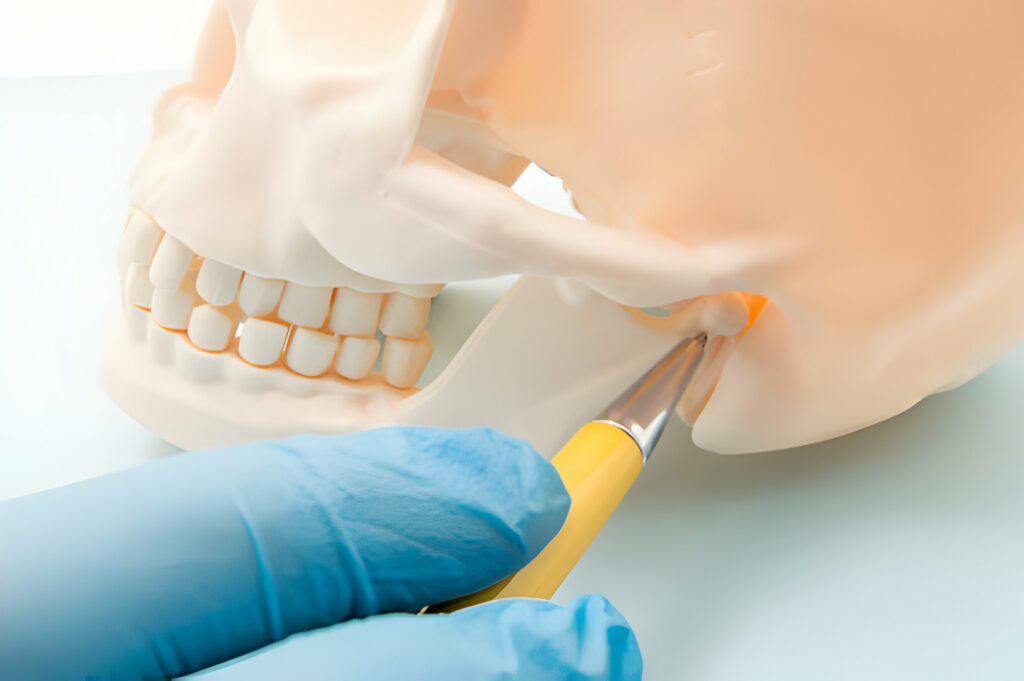
Your Jaw Muscles May Become Stiff
If you experience pronounced stiffness or tightness in the jaw muscles upon waking up, it could be a possible sign of TMJ dysfunction. This stiffness can persist throughout the day, giving way to other symptoms such as pain and limited jaw movement.
You May Experience Frequent Headaches
If you have TMJ dysfunction, you may experience recurring headaches, particularly tension headaches. These headaches may last several hours and occur once a week or more.
What Causes TMJ Dysfunction in the First Place?
There are several reasons why you might be suffering from jaw pain disorder. Here’s a list of examples:
- Jaw injury or trauma caused by accidents
- Arthritis caused by old age and cartilage degeneration
- Malocclusion, or misaligned and uneven teeth
- Muscle tension, stress, anxiety, etc.
- Genetic factors
- Poor posture, such as slumped back
- Straining and overuse/unnecessary use of teeth while biting nails, prolonged chewing of chewing gums
- Medical conditions like fatigue syndrome, fibromyalgia, and jaw tumors.
Diagnosis Of TMJ Dysfunction
Diagnosing TMJ dysfunction typically involves thoroughly assessing patient history, physical examination, and imaging studies. Your dentist may begin by discussing your symptoms, such as jaw pain, clicking or popping sounds, difficulty chewing, and headaches.
They then comprehensively examine the jaw’s range of motion, bite alignment, and any signs of muscle tenderness or swelling around the jaw joint. Dentists in Killeen, TX, use imaging techniques like X-rays, CT scans, or MRI to visualize the joint and surrounding structures. It helps them identify jaw dysfunctionalities and abnormalities.
Lifestyle Changes to Manage TMJ Disorder
TMJ dysfunctions can bring discomfort and limited jaw movement. Adopting certain lifestyle adjustments can significantly relieve symptoms and enhance TMJ function. These adjustments are:
- Focus on Managing Your Stress
Chronic stress can worsen TMJ symptoms by causing jaw clenching and teeth grinding. Stress-relief practices like meditation and deep breathing can relax jaw muscles and reduce tension.
- Always Maintain A Good Posture
Poor posture can strain muscles and joints around the jaw. Ensuring proper posture while sitting or standing can help ease TMJ discomfort.
- Exercise Your Jaw Muscles Regularly
Gentle exercises to strengthen and stretch jaw muscles can enhance TMJ mobility and reduce pain. These may include simple jaw movements and gentle massages.
- Make Changes In Your Diet
Certain foods, like hard or chewy ones, can worsen TMJ symptoms. Opting for softer foods and cutting food into smaller pieces can lessen strain on the jaw joint.
- Avoiding Habits That Strain Your Jaw
Habits like nail biting and excessive gum chewing can stress the jaw joint. Avoiding such habits can help prevent further discomfort.
Treatment Options For TMJ Disorder
Sometimes, self-care and lifestyle adjustments fail to manage TMJ disorder. In that case, you can resort to the effective treatment options performed by dentists in Killeen, TX.
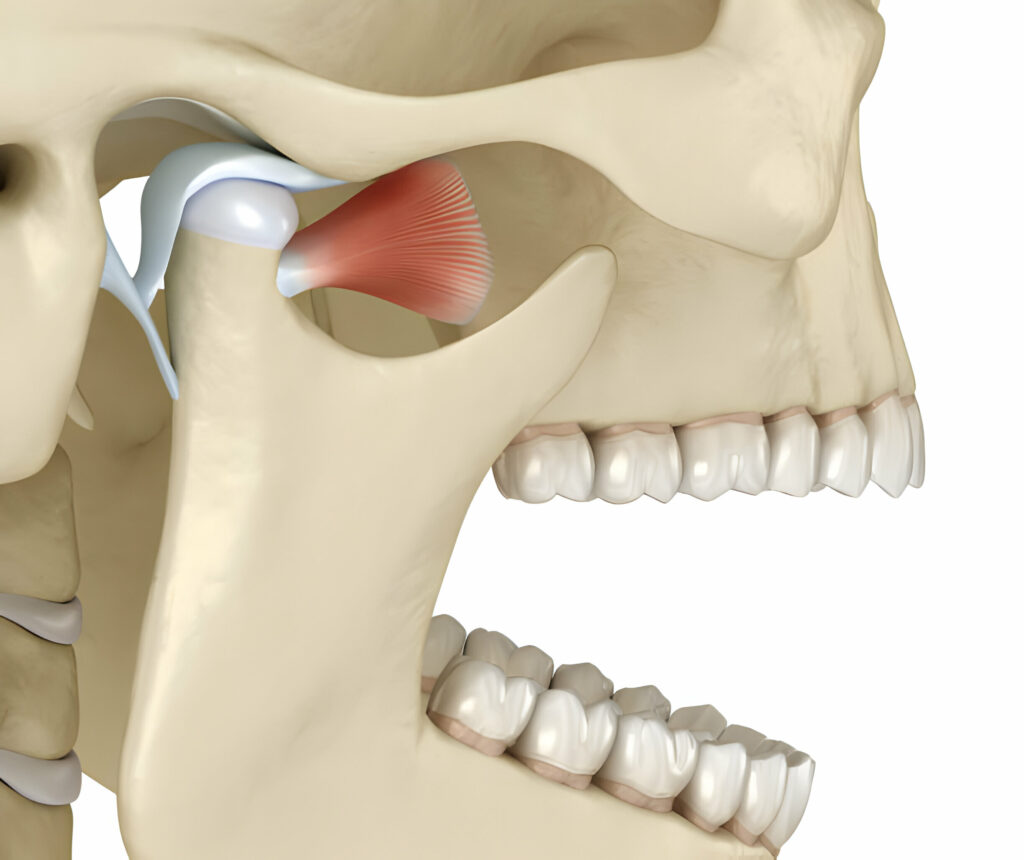
Treatment strategies often involve a combination of non-invasive and surgical approaches tailored to individual needs. Let’s learn more about them in this section:
Prescribed Drugs for TMJ
- Pain relief: Over-the-counter pain medications like ibuprofen or acetaminophen can help manage mild to moderate TMJ pain.
- Muscle relaxants: Our dentists may prescribe muscle relaxants to alleviate muscle tension and spasms in the jaw.
- Antidepressants: Tricyclic antidepressants can sometimes help manage pain and improve sleep quality for TMJ patients.
- Anti-anxiety medications: For individuals whose TMJ symptoms are aggravated by stress or anxiety, anti-anxiety medications may offer relief.
Non-surgical Treatments
- Physical therapy: Physical therapists may provide guided jaw exercises, stretches, and massage techniques to enhance jaw mobility and reduce muscle tension.
- Oral appliances: Our dentists may provide custom-fitted mouthguards or splints to prevent teeth grinding and alleviate pressure on the joint.
- Heat or cold therapy: Applying heat or cold packs to the jaw area can temporarily reduce pain and inflammation.
Surgical Intervention
- Arthrocentesis: It is a minimally invasive procedure involving the insertion of needles into the joint. This is done to remove inflammatory substances and improve joint function.
- Arthroscopy: This refers to a surgical intervention using a small camera to diagnose and treat internal joint issues such as damaged cartilage or displaced discs.
- Open joint surgery: Reserved for severe cases, this procedure involves repairing or replacing damaged joint structures or correcting structural abnormalities.
Takeaway
- TMJ disorder affects about 12% of Americans, causing jaw discomfort and daily life disruptions.
- Symptoms include jaw pain, chewing difficulties, restricted movement, facial discomfort, jaw muscle stiffness, and tension headaches.
- The chief causes range from teeth grinding and jaw injury to arthritis and stress-related muscle tension.
- Lifestyle changes such as stress management, maintaining good posture, jaw exercises, and dietary adjustments can help alleviate TMJ disorder.
- Treatment options include medications, non-surgical approaches like physical therapy and oral appliances, and, in severe cases, surgical interventions.
- Don’t risk your smile! Connect with our experts at Killeen Dental Group today!


